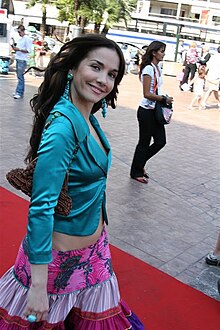Natalia Oreiro
Natalia Oreiro (born May 18, 1977 in Montevideo,Uruguay) is a Latin Grammy-nominated Uruguayan singer and actress. She has been in both soap operas and movies. She is best known for her participation in the soap opera, Muñeca Brava (1998-1999), which was an every-afternoon-smash-hit during its run in Argentina. Her most recent soap opera, Sos mi vida (2006), was shown in more than 40 countries.[1]
Natalia Oreiro | |
|---|---|
 | |
| Background information | |
| Birth name | Natalia Marisa Oreiro Iglesias |
| Also known as | Naty |
| Born | May 19, 1977 |
| Origin | Montevideo, Uruguay |
| Genres | Latin pop |
| Occupation(s) | Singer, songwriter, actress, model |
| Instruments | Vocals |
| Years active | 1990s-present |
| Labels | BMG |
Life
changeNatalia Oreiro was born in Montevideo, Uruguay on May 19, 1977. She is daughter of Carlos Oreiro Poggio and the painter Mabel Iglesias Bourié. She studied drama when she was eight years old than she appeared in advertisements at twelve years old such as Coca-Cola, Pepsi and Johnson & Johnson.
When she was fifteen years old, she joined Latin America's show El Show de Xuxa and won the competition.[2] At the age of 16 she moved to Argentina to work there. She worked as an MTV VJ and in 1995, she landed a role in the soap opera Dulce Ana. After that she st in the TV series 90-60-90 modelos (1996) and Ricos y famosos (1997). In Ricos y famosos, Oreiro played fictional character Valeria.
In 1998, Natalia Oreiro starred in her first movie Un Argentino en New York with Guillermo Francella. Un Argentino en New York was watched by 1.634.702 people in Argentina.[3] After the movie, she released three studio albums (Natalia Oreiro, Tu Veneno, Turmalina) and she starred many TV series and movies.
Music
changeNatalia Oreiro
changeIn 1998, Natalia Oreiro released single "Que Sí, Que Sí" from Un Argentino en New York. Than she launched her first studio album Natalia Oreiro (1998). "Cambio Dolor" was first single from her debut album and became the opening theme for the prime time show Muñeca Brava (1998-1999).
Album was ranked eighty-first in list of "Worldbeat Global Album Chart"[4] and sold over 140,000 copies[5] therefore received a double platinum disc in Argentina and gold disc in countries like Greece, Slovenia and Israel.[5]
Tu Veneno
changeIn 2000, her second studio album, Tu Veneno (Your Poison) was released and was presentation in "Gala de la Hispanidad", "Gala de Murcia" (both in Spain) and "Festival de la Calle 8" in Miami. She was nominated for Latin Grammy Awards,[6] but lost to Christina Aguilera's Mi Reflejo. Oreiro was first Uruguayan nominated for a Grammy.[7] She was crowned Queen of that event at Viña del Mar Festival 2000 in Chile.[8] 3rd music video of album "Cómo Te Olvido" (2001) was directed by Tudor Giurgiu in Dracula's Castle, Romania.[9]
Turmalina
changeOreiro's next and last album, Turmalina, was released in 2002 and centered around a superhero character named Turmalina who is created by Oreiro. Turmalina was produced by Latin maker Kike Santander. The album was recorded in USA. "Que Digan Lo Que Quieran" (Should they say whatever they want) was first single from Turmalina. "Cuesta Arriba, Cuesta Abajo" became the opening theme for soap opera Kahorra. Natalia made contributions with singer/songwriter Jaime Roos and Falta y Resto for the official Uruguayan 2002 FIFA World Cup song "Pasión Celeste".
Discography
change- 1998: Natalia Oreiro
- 2000: Tu Veneno
- 2002: Turmalina
Artistic career
changeSoap operas
change- Inconquistable corazón (Canal 9, 1994-1995) as Victoria
- Dulce Ana (Canal 9, 1995) as Verónica Iturbe-Montalbán
- 90-60-90 modelos (Canal 9, 1996-1997) as Lucía Peralta
- Ricos y famosos (Canal 9, 1997-1998) as Valeria García Méndez de Salerno
- Muñeca brava (Telefe, 1998-1998) as Milagros 'Mili' Esposito-Di Carlo de Miranda (Cholito/Carlitos)/young Rosario
- Kachorra (Telefe, 2002) as Antonia Guerrero (Kachorra) alias Rosario Achával/Piojo
- El deseo (Telefe, 2004) as Carmen
- Sos mi vida (Canal 13, 2006)as Esperanza Muñoz - La Monita
Filmography
change- Un Argentino en New York (1998) as Verónica 'Vero' De Ricci
- Cleopatra (movie) (2003) as Sandra
- La guerra de los gimnasios (2004)
- Las vidas posibles (2005) as Marcia
- La Peli (2006) - (2007) as journalist
- Rambleras (2007)
References
change- ↑ Diario Clarín Archived 2008-05-26 at the Wayback Machine "se vendió a más de 40 países, entre ellos Bélgica, Rusia, Rumania, Hungría, Grecia y República Checa"
- ↑ "Pero Oreiro nunca trabajó para la Reina de los Bajitos (N: por Xuxa). Su contrato se terminó cuando la rubia brasileña tuvo una hernia de disco. Siguió modelando y después comenzó con su carrera actoral." - Natalia Oreiro: ensalada rusa Archived 2009-02-01 at the Wayback Machine
- ↑ "Una cantante sin fronteras". Terra.com.ar. Archived from the original on 2009-03-18. Retrieved 2008-12-30.
- ↑ "Worldbeat Global Album Chart -- top 100 for 2000". Archived from the original on January 10, 2004. Retrieved October 5, 2009.
- ↑ 5.0 5.1 "Natalia Oreiro » Biografía". Archived from the original on February 10, 2005. Retrieved October 5, 2009.
- ↑ "Los nominados".
- ↑ Natalia Oreiro es sexy, brava y latinoamericana Archived 2008-11-23 at the Wayback Machine "... first Uruguayan nominated for a Latin Grammy..."
- ↑ "La reina se llama Natalia Oreiro". Archived from the original on 2009-10-04. Retrieved 2009-10-05.
- ↑ "Natalia Oreiro: Como te olvido". Archived from the original on 2008-07-19. Retrieved 2009-10-05.